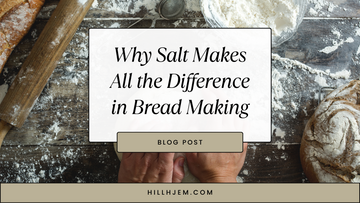
We've all been there: excitedly mixing up a loaf of bread, only to realize with a sinking heart that we forgot the salt. The result? An explosive mess!
While flour, water, and yeast are the foundation of bread, salt plays a crucial, often underappreciated role in the world of baking particularly in creating the delicious, textured loaves we know and love.
So, ditch the "just for flavor" mentality, and let's explore why salt plays a pivotal role in the success of any bread recipe.
1. Flavor Enhancement
At first glance, it might seem that salt is just a flavor enhancer, providing that familiar savory taste to the bread we all love. However, its impact goes beyond mere taste buds.
Salt acts as a modulator, accentuating and balancing the overall flavor profile. Without this crucial ingredient, bread can fall flat, lacking the depth and complexity we often enjoy. Indeed, it is the inclusion of salt that allows the natural sweetness of the flour to truly shine, creating a more nuanced and satisfying eating experience.
2. Dough Strengthening
While you might not think of it as essential, salt is a game-changer in bread baking. It is a remarkable agent in controlling the fermentation process, which is essential for the development of gluten in the dough. Gluten, a network of proteins formed when flour mixes with water, is responsible for the structure and texture of the bread. Salt strengthens the gluten network by regulating the enzymatic activity of yeast, slowing down the fermentation process.
This results in a loaf that's both airy and light, thanks to the trapped air bubbles, and satisfyingly chewy due to the well-developed gluten. In short, salt's not just about taste, it's about sculpting the perfect bread texture!
3. Yeast Regulation
Imagine a bustling bakery with bakers rushing around, adding too much yeast to their dough. The result? A chaotic rise, leading to a bread with a rough, uneven texture.
Yeast, a living organism responsible for the leavening of bread, is a key player in the fermentation process. Salt helps to regulate yeast activity, providing a more balanced and controlled fermentation. It slows down gas production, ensuring a controlled and even rise, ultimately leading to a well-structured loaf with a smooth, consistent crumb.
4. Improved Shelf Life
Beyond the initial baking process, salt plays a crucial role in extending the shelf life of bread. It acts as a natural preservative, inhibiting the growth of certain microorganisms that can lead to spoilage. The antimicrobial properties of salt not only contribute to the bread's longevity but also enhance its overall quality over time.
So, what does that mean for you? A well-salted bread stays fresher and yummier for days, perfect for enjoying those savory slices at your own pace. Talk about practical and delicious!
5. Texture and Crust Development
Salt contributes significantly to the texture and crust development of bread. By controlling yeast activity, salt influences the air bubbles forming in the dough, creating a fine-grained crumb with a satisfying chew. Additionally, the presence of salt on the surface of the dough contributes to the development of a desirable crust during baking. During baking, the "Maillard reaction", a complex chemical process that occurs between amino acids and reducing sugars, happens and is enhanced by salt, resulting in a golden-brown crust with a rich and complex flavor.
6. Salt as a Flavor Balancer
Apart from enhancing the inherent flavors of the bread ingredients, salt also acts as a flavor balancer. It helps mask any undesirable bitter notes that may arise during the fermentation process. This balancing act ensures that the bread achieves a harmonious flavor profile, free from any overpowering or unpleasant tastes.
Salt doesn't just mask, it enhances. It highlights the sweetness of the sugars, the nuttiness of the flour, and the richness of other ingredients, creating a symphony of deliciousness.
The ability of salt to bring together and balance various flavors is a subtle yet essential aspect of successful bread making.
The Importance of Proper Salt Measurement
While salt is essential in bread making, the quantity used must be carefully measured. Too little salt can result in bland-tasting bread with weak structure, while too much salt can inhibit yeast activity excessively, leading to dense and overly salty loaves. Professional bakers often follow precise recipes that specify the exact amount of salt required for a particular type of bread, ensuring consistent results.
Now that you've unlocked the power of salt in baking, are you ready to put your knowledge to the test? Grab your favorite bread recipe and try it out for yourself! You'll be amazed at the difference a pinch of salt can make.




